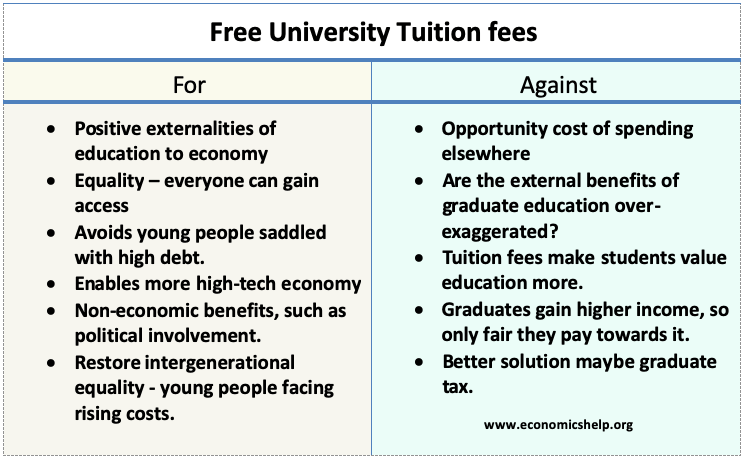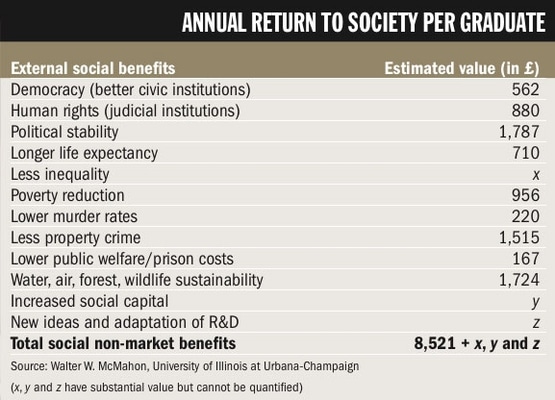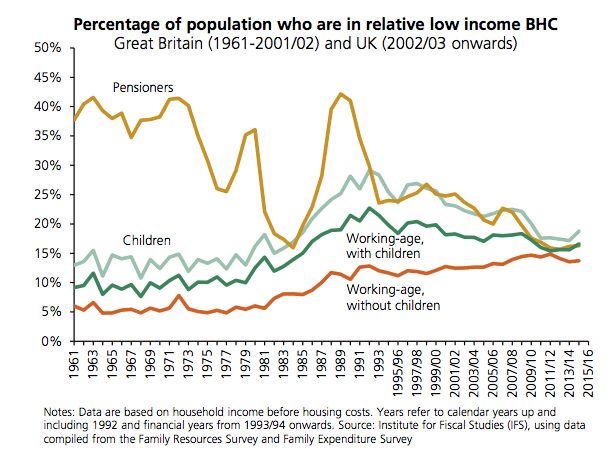Summary
Education has positive benefits for the rest of society. If university education is left to market forces, there may be under-provision, and the economy may suffer from a lack of skilled graduates. Furthermore, in a free market, higher education would become the preserve of wealthy families who can afford to send their children to university. Therefore there is a strong case for the government providing higher education free at the point of use.

However, others argue the positive externalities of higher education are limited, and the prime beneficiaries of a university degree are the graduates who can command a higher paying job. If the external benefits of many degrees are limited, government spending may be misallocated in offering relatively expensive university education. Rather than fund 3-4 year university degrees, governments may be able to get a better return from spending money on primary education and vocational training – training which is more relevant to the needs of the economy.

More details
In recent years, the UK government has sought to increase the amount students pay for studying at university. In the UK, the government have phased out grants and introduced top-up fees. With tuition fees and rising living costs, students could end up paying £50,000 for a three-year degree, and leave university with significant debts.
Some argue this is a mistake. Charging for university education will deter students and leave the UK with a shortfall of skilled labour – and arguably this will damage the long-term prospects of the UK economy. Furthermore, charging to study at university will increase inequality of opportunity as students with low-income parents will be more likely to be deterred from going to university.
Arguments for free university education
- Positive externalities of higher education. Generally, university education does offer some external benefits to society. Higher education leads to a more educated and productive workforce. Countries with high rates of university education generally have higher levels of innovation and productivity growth. Therefore, there is a justification for the government subsidising higher education.
- Equality. There is also a powerful argument that university education should be free to ensure equality of opportunity. If students have to pay for university education, this may dissuade them. In theory, students could take out loans or work part-time, but this may be sufficient to discourage students from studying and instead may enter the job market earlier.
- Increased specialisation of work. The global economy has forced countries, such as the UK to specialise in higher-tech and higher value-added products and services. The UK’s biggest export industries include pharmaceuticals, organic chemicals, optical and surgical instruments, and nuclear technology (see: what does the UK produce?). Therefore, there is a greater need for skilled graduates who can contribute to these high-tech industries.
- Education is a merit good. One characteristic of a merit good is that people may underestimate the benefits of studying and undervalue higher education. Government provision can encourage people to study.
- Young people facing rising costs. In recent years, we have seen a rise in the cost of living. House prices and rents have risen faster than inflation. This means young people are struggling to meet living costs – even in work. The thought of student debt on top of high living costs, may dissuade people from studying. Free tuition fees is a way to restore the income inequality across generations.
- Non-economic benefits of education. It is tempting to think of university education in purely monetary terms. But graduates can also gain skills and awareness of civic institutions which offer intangible benefits to society.
Source: Times Higher Education
Higher Learning, Greater Good: The Private and Social Benefits of Higher Education (2009) Professor McMahon examined the “private non-market benefits” for individuals of having degrees.
This includes better personal health and improved cognitive development in their children, alongside the “social non-market benefits”, such as lower spending on prisons and greater political stability.
- If you wished to evaluate this point, we could ask – is it university education which causes these civic virtues or is it because university education is dominated by middle classes who are more likely to have better health e.t.c. already?
Arguments against free university education
- Opportunity cost. If we spend billions on free university education, there is an opportunity cost of higher taxes or less spending elsewhere. Arguably, there is a greater social benefit from providing vocational training – e.g. so people could become plumbers, electricians e.t.c. There is often a real shortage of these skills in an economy. The UK Commission for skills and education report significant skills shortages in the basic ‘core generic skills’ such as literacy, numeracy and communication skills. These skill shortages are prominent in industries like building, health care, plumbing, social care and construction. The problem is not a shortage of graduates with art degrees, but a shortage of lower-level vocational skills. (See: BBC – skills shortage in the UK) Therefore, there is a case for charging students to study at university – allowing higher public spending to tackle more basic skill shortages.




